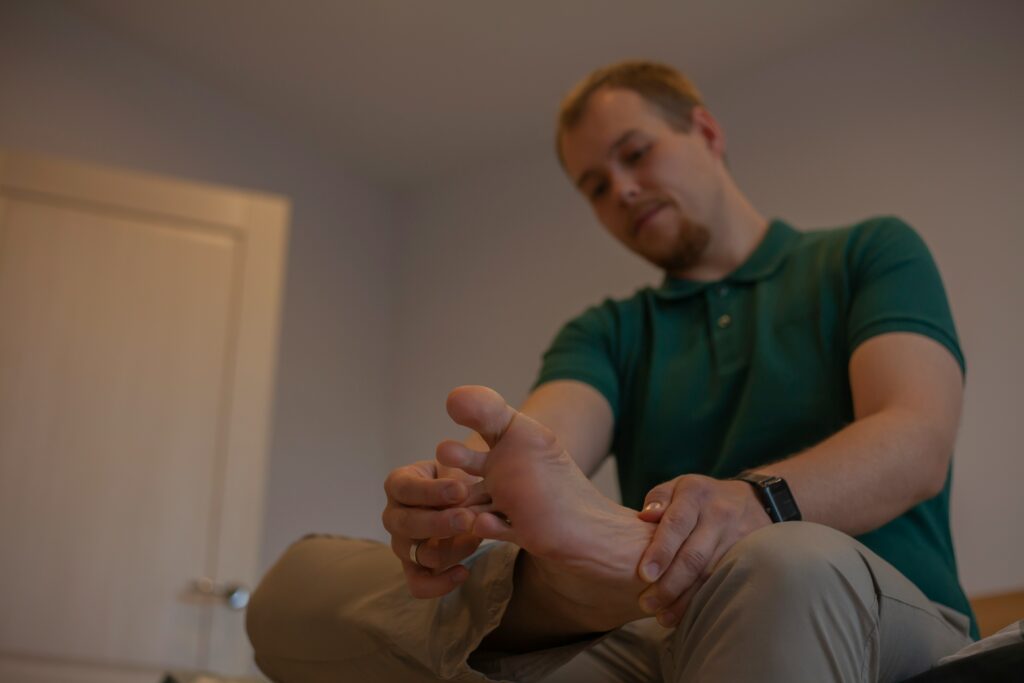Our feet and ankles carry us through life, but they are often taken for granted until pain or injury strikes. At Achilles Foot and Ankle Center, we believe that understanding common foot and ankle conditions is the first step toward maintaining good foot health. Let’s explore some of the most frequent issues, their symptoms, and available treatments to help you get back on your feet—pain-free!

1. Plantar Fasciitis
Symptoms:
Plantar fasciitis is one of the most common causes of heel pain. It occurs when the thick band of tissue running across the bottom of the foot (plantar fascia) becomes inflamed. Symptoms often include stabbing pain near the heel, especially with the first steps in the morning or after long periods of rest.
Treatments:
Treatment typically involves rest, icing, stretching exercises, and anti-inflammatory medications. Custom orthotics or supportive footwear can provide relief. In more severe cases, physical therapy or steroid injections may be recommended.
2. Achilles Tendonitis
Symptoms:
Achilles tendonitis refers to inflammation of the Achilles tendon, the band of tissue that connects the calf muscles to the heel. Symptoms include pain and stiffness along the tendon, particularly after physical activity. Swelling or thickening of the tendon can also occur.
Treatments:
Initial treatments often include rest, ice, and over-the-counter pain relievers. Stretching and strengthening exercises, along with physical therapy, can help reduce pain. In persistent cases, advanced therapies like platelet-rich plasma (PRP) injections or surgery may be necessary.
3. Ankle Sprains
Symptoms:
Ankle sprains occur when the ligaments supporting the ankle stretch or tear, usually due to a sudden twisting motion. Symptoms include pain, swelling, bruising, and difficulty walking or bearing weight on the affected ankle.
Treatments:
The RICE method (Rest, Ice, Compression, Elevation) is the first line of treatment. More severe sprains may require bracing or physical therapy to restore strength and mobility. In rare cases, surgery may be required to repair torn ligaments.
4. Bunions
Symptoms:
A bunion is a bony bump that forms on the joint at the base of the big toe. It can cause pain, swelling, and redness around the joint, and in some cases, it may make walking difficult. Bunions often worsen over time if left untreated.
Treatments:
Non-surgical treatments include wearing comfortable, roomy shoes, using padding or splints, and taking anti-inflammatory medications. In more severe cases, bunion surgery (bunionectomy) may be needed to correct the deformity and relieve pain.
5. Flat Feet
Symptoms:
Flat feet occur when the arches of the feet are either too low or absent. This condition can lead to foot pain, especially in the heel or arch area, as well as ankle and knee pain due to improper alignment.
Treatments:
Custom orthotics, supportive shoes, and physical therapy can help alleviate discomfort. In rare cases, surgery may be recommended to correct structural issues and restore proper foot function.
6. Morton’s Neuroma
Symptoms:
Morton’s neuroma is a painful condition affecting the ball of the foot, usually between the third and fourth toes. It occurs when the tissue around one of the nerves leading to the toes thickens, causing sharp, burning pain or numbness.
Treatments:
Treatment options include changing footwear, using custom orthotics, corticosteroid injections, or physical therapy. For more severe cases, surgical removal of the affected nerve may be necessary.
7. Stress Fractures
Symptoms:
Stress fractures are tiny cracks in the bones, usually caused by overuse or repetitive activity. They most commonly occur in the weight-bearing bones of the foot and ankle, leading to localized pain that worsens with activity.
Treatments:
Treatment typically involves rest, modifying physical activities, and wearing supportive footwear or a brace to allow the bone to heal. In some cases, surgery may be needed if the fracture doesn’t heal properly.
When to Seek Professional Help
If you’re experiencing persistent foot or ankle pain, it’s essential to seek professional care. Ignoring symptoms can lead to more severe issues down the road. At Achilles Foot and Ankle Center, our expert team is dedicated to diagnosing and treating a wide range of foot and ankle conditions using the latest technology and personalized treatment plans.
Conclusion
Foot and ankle pain doesn’t have to be part of your everyday life. Whether you’re dealing with a common issue like plantar fasciitis or a more complex condition like Morton’s neuroma, early diagnosis and treatment can make all the difference. Contact Achilles Foot and Ankle Center today to schedule an appointment and take the first step toward healthier, pain-free feet!
Achilles Foot and Ankle Center is here to provide expert care and compassionate treatment. Reach out to us for all your foot and ankle health needs. Need a same day appointment? We are a step away from quality care!






